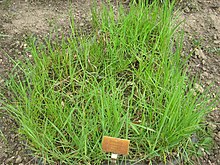Scolochloa
| Scolochloa | |
|---|---|

| |
| Scientific classification | |
| Kingdom: | Plantae |
| Clade: | Tracheophytes |
| Clade: | Angiosperms |
| Clade: | Monocots |
| Clade: | Commelinids |
| Order: | Poales |
| Family: | Poaceae |
| Subfamily: | Pooideae |
| Supertribe: | Poodae |
| Tribe: | Poeae |
| Subtribe: | |
| Genus: | Scolochloa Link |
| Species: | S. festucacea
|
| Binomial name | |
| Scolochloa festucacea | |
| Synonyms[1][2] | |
| |
Scolochloa is a genus of grasses in the family Poaceae / Gramineae, now containing a single species, Scolochloa festucacea. Common rivergrass is a common name for the species.[3] Scolochloa festucacea grows in Europe, temperate Asia, and North America.[4][5][6][7][8][1][9] Its culms are erect and 100–150 centimetres (39–59 in) in height; its leaf blades are 15–30 cm (5.9–11.8 in) long and 5–10 mm (0.20–0.39 in) wide.
The genus formerly included a second species, Scolochloa arundinacea, which is now placed in the genus Arundo as Arundo donax.[1]
References[]
| Wikispecies has information related to Scolochloa. |
| Wikimedia Commons has media related to Scolochloa. |
- ^ Jump up to: a b c Kew World Checklist of Selected Plant Families
- ^ Tropicos, Scolochloa Link
- ^ "Scolochloa festucacea". Natural Resources Conservation Service PLANTS Database. USDA. Retrieved 8 November 2015.
- ^ Link, Johann Heinrich Friedrich. 1827. Hortus Regius Botanicus Berolinensis 1: 136
- ^ Flora of China Vol. 22 Page 244 水茅属 shui mao shu Scolochloa Link, Hort. Berol. 1: 136. 1827.
- ^ Biota of North America Program 2013 county distribution map
- ^ Grassbase - The World Online Grass Flora
- ^ GBIF entry
- ^ Cabi, E. & M. Doğan. 2012. Poaceae. 690–756. In A. Güner, S. Aslan, T. Ekim, M. Vural & M. T. Babaç (eds.) Türkiye Bitkileri Listesi. Nezahat Gökyiğit Botanik Bahçesi ve Flora Araştırmaları Derneği Yayını, Istanbul
Categories:
- Pooideae
- Grasses of the United States
- Grasses of Canada
- Monotypic Poaceae genera
- Pooideae stubs